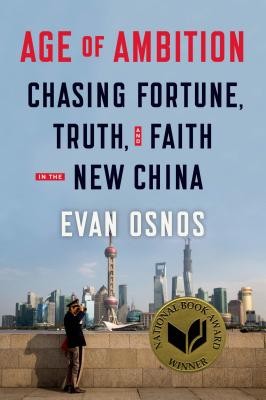Review of 'Age of ambition : chasing fortune, truth, and faith in the new China' on 'Goodreads'
3 stars
(This review is crossposted from my blog here: daariga.wordpress.com/2016/09/25/age-of-ambition/)
The lifting of hundreds of millions of Chinese out of poverty is undoubtedly the greatest achievement of the last few decades. In merely a generation, China abandoned the disastrous ideology of Chairman Mao, became the factory of the planet and the world’s second largest economy. The Communist Party continues a complicated game of chess to balance the aspirations of its people while stifling any hints of dissent, disruption to social order or debate about democracy. What are the dreams, hopes, achievements and failures of the generation of Chinese who have only lived in this new age? How are Chinese citizens and their leaders coping with the tectonic changes their nation is going through? Evan Osnos tries to show these points of view of the people in his book Age of Ambition: Chasing Fortune, Truth and Faith in the New China.
The book is based off his 8-year stint in China as a staff reporter for The New Yorker. It is a collection of short essays roughly divided into the three aspects of fortune, truth and faith mentioned in the title. Each essay uses the life, dreams or travails of a leader, activist or a citizen that Evan met in China. In the fortune section, we see a new generation of Chinese who dream of riches and many who achieve it. The tales of people in press and law who are constantly censored and tormented by The Party for crossing lines are in the truth aisle. In the final section are the Chinese looking for meaning in this new way of life and many returning to the folds of religion.
Though Chinese no longer have to worry about poverty, health or education, there is increasing inequality. Corruption in business and politics are at astronomic levels. Though the party relentlessly censors all signs of trouble both online and in the press, hundreds of protests occur every day across the nation. China has moved ahead at rocket speed and the signs of wear are showing through in incidents like the baby milk poisoning, the Sichuan earthquake rescue or the disastrously handled coverup of a high-speed rail accident. We see these and other major incidents of the last few years in China through the eyes of the people in these essays.
If you regularly read about China in The Economist or The New York Times, you will be familiar with many of the faces and stories in this book. That might bias me a bit when I talk about this book. The first section I found to be the weakest, where Evan drops names a lot and mixes many characters across his essays. It gets better as the book progresses with focus on a single person or event in each essay. The writings on the high speed rail incident and on religion are very interesting. I especially loved the tidbits where Evan talks about his daily life and neighbors during his stay in China. Probably my biggest peeve with this good book is its verbiage. I have seen this with many Western folks who write about Asia or Africa, they try to describe every single dialog or experience they had. With some heavy editing, this book could have been a great insight into New China.

